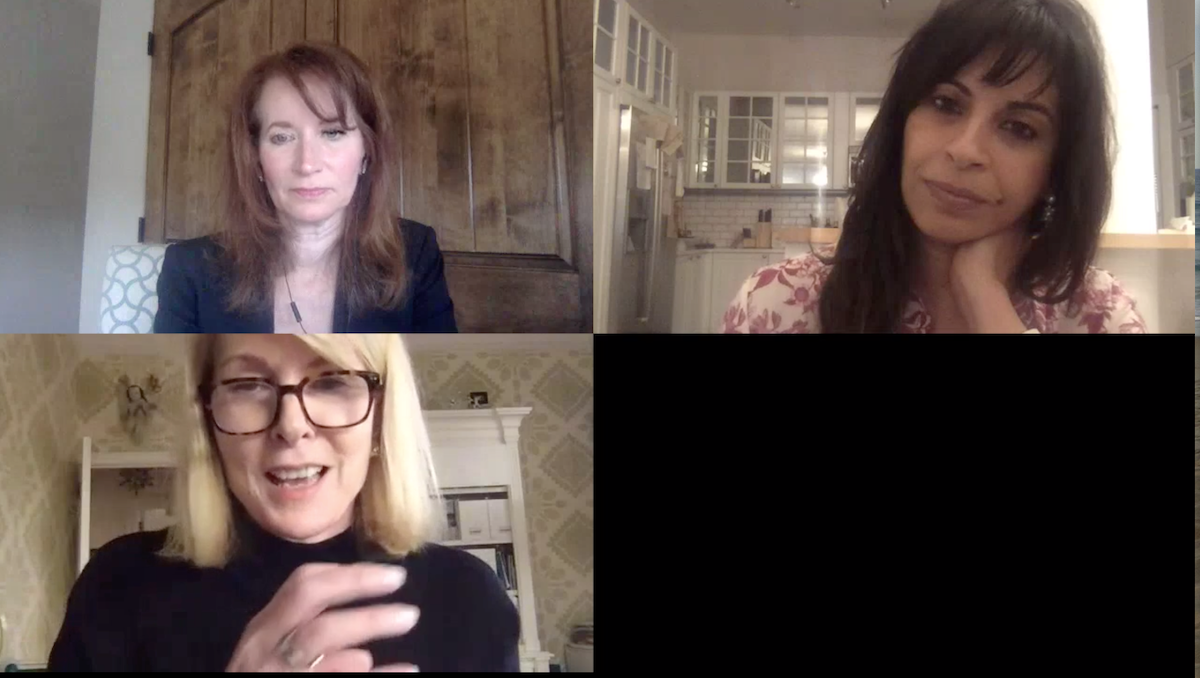
This editorial article is a part of Funding Women Founders Month of Technical.ly's editorial calendar.
The pandemic has set the clock back for many aspects of women’s advancement toward professional equality — wages and promotions were lost, parenting largely fell to mothers and millions more women than men lost their jobs in the mass layoffs and furloughs.
And while entrepreneurs saw pretty normal (even great, in Philly) venture capital deals last year, women made up a very small percentage.
“The news was not good,” said Pam Kostka, CEO of All Raise, the national org focused on boosting gender diversity in VC, during a panel on funding women founders during Comcast and LIFT Labs‘ Funding Summit Wednesday.
Out of all VC deals last year, 2.2% went to exclusively women-founded companies, Kostka said, and only 12.2% went to mixed-gender teams. It’s a “backslide” for women founders, she said.
Still, female founders didn’t miss a beat during the pandemic, said Susan Lyne, cofounder and managing partner of BBG Ventures. They still raised $5 billion, she pointed out, and the best thing founders can do is recognize that there is capital out there.
“I think spending too much time on the negatives is not going to do anybody a lot of good,” she said. “We have to do that, but I don’t think female founders should be doing that.”
Along with the pandemic, the racial justice movement will certainly impact the way venture capitalists are deploying funds, Kostka said. Black women entrepreneurs received less than 1% of overall VC funding since 2018.
The numbers are not surprising, said Anu Duggal, founding partner of Female Founders Fund. The venture ecosystem is largely driven by limited partners, she added, and if they’re not the ones driving change within VC, it will be tough to see it come to light. The more women who you see leading successful companies — like Whitney Wolfe Herd and the Bumble IPO or Anne Wojcicki and 23andMe’s IPO — live as examples.
“Where it tends to get harder is late-stage,” Duggal said. “If you look at the typical late-stage fund, you don’t really see a lot of women or diversity at all. And so I don’t think that impact of pushing more diversity at those later-stage growth funds has happened yet. You need to have diversity of thought in order for people to see out of their box.”
Indeed, the later-stage funding has been more difficult for women founders. In 2020, just 10 of the 120 new unicorn companies had a woman founder. About 8% of women-founded companies got a seed deal in 2020, but only about 2% got a later-stage deal, Crunchbase found.
Lyne’s advice?
“The minute you raise your seed round, it’s time to start thinking about your Series A,” she said.
It’s where women founders tend to run into a lot of problems, she said. You can’t wait until it’s time to start raising capital to meet with VCs. If your seed round will get you 18 months of runway, start meeting and talking to investors now, and actually begin your fundraising 15 months from now.
And, investors have to believe that every investment has the potential to be a real winner — instead of explaining what you’re building right now, sell them on why your idea will be a billion-dollar one a few years from now, Lyne added.
And women investors may be in the unique position to identify opportunities early that investors who are men may miss. (Note: fertility startup Stix’s $3.5 million raise announced this week.) In their first and second fund, Duggal said, there were companies in the astrology, mental health and beauty fields that other VCs weren’t going for that ended up providing a huge ROI.
And there are so many areas in the last year alone that have proved for great business solutions — healthcare, education, work-from-home collaboration tools — that will make great companies.
“That is an inherent advantage, when you’re competing against hundreds of funds and you can recognize consumer behavior shifting,” Duggal said. “I think that sets you up to have a different lens and to be able to identify different opportunities.”
Check out more coverage from the Funding Summit with this recap of Cleo Capital Managing Director Sarah Kunst’s talk on how founders can find success in their markets.
Before you go...
Please consider supporting Technical.ly to keep our independent journalism strong. Unlike most business-focused media outlets, we don’t have a paywall. Instead, we count on your personal and organizational support.
3 ways to support our work:- Contribute to the Journalism Fund. Charitable giving ensures our information remains free and accessible for residents to discover workforce programs and entrepreneurship pathways. This includes philanthropic grants and individual tax-deductible donations from readers like you.
- Use our Preferred Partners. Our directory of vetted providers offers high-quality recommendations for services our readers need, and each referral supports our journalism.
- Use our services. If you need entrepreneurs and tech leaders to buy your services, are seeking technologists to hire or want more professionals to know about your ecosystem, Technical.ly has the biggest and most engaged audience in the mid-Atlantic. We help companies tell their stories and answer big questions to meet and serve our community.
Join our growing Slack community
Join 5,000 tech professionals and entrepreneurs in our community Slack today!

This Week in Jobs: Fall from the coconut tree and check out these 22 career opportunities

Gen Z pivots to gig jobs instead of full-time work: Who is that good for?

AI takes center stage in Penn’s plan for overhauling its business education programs



